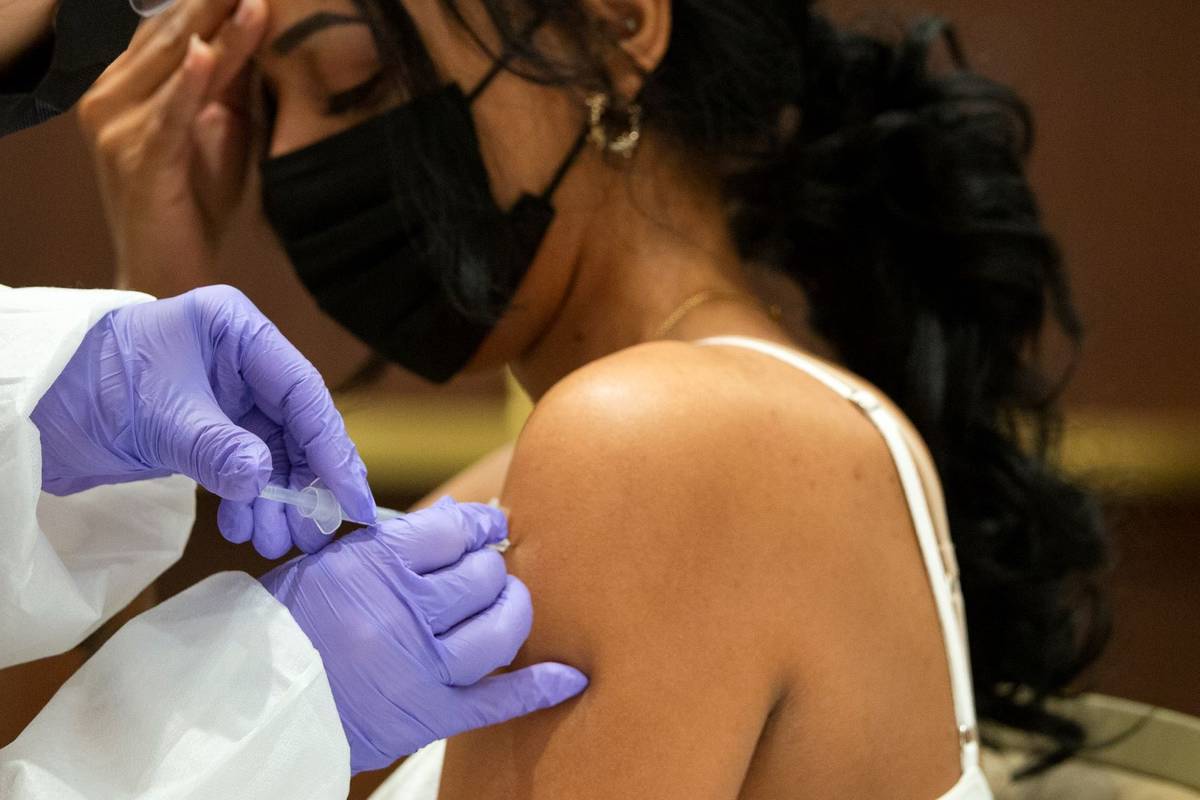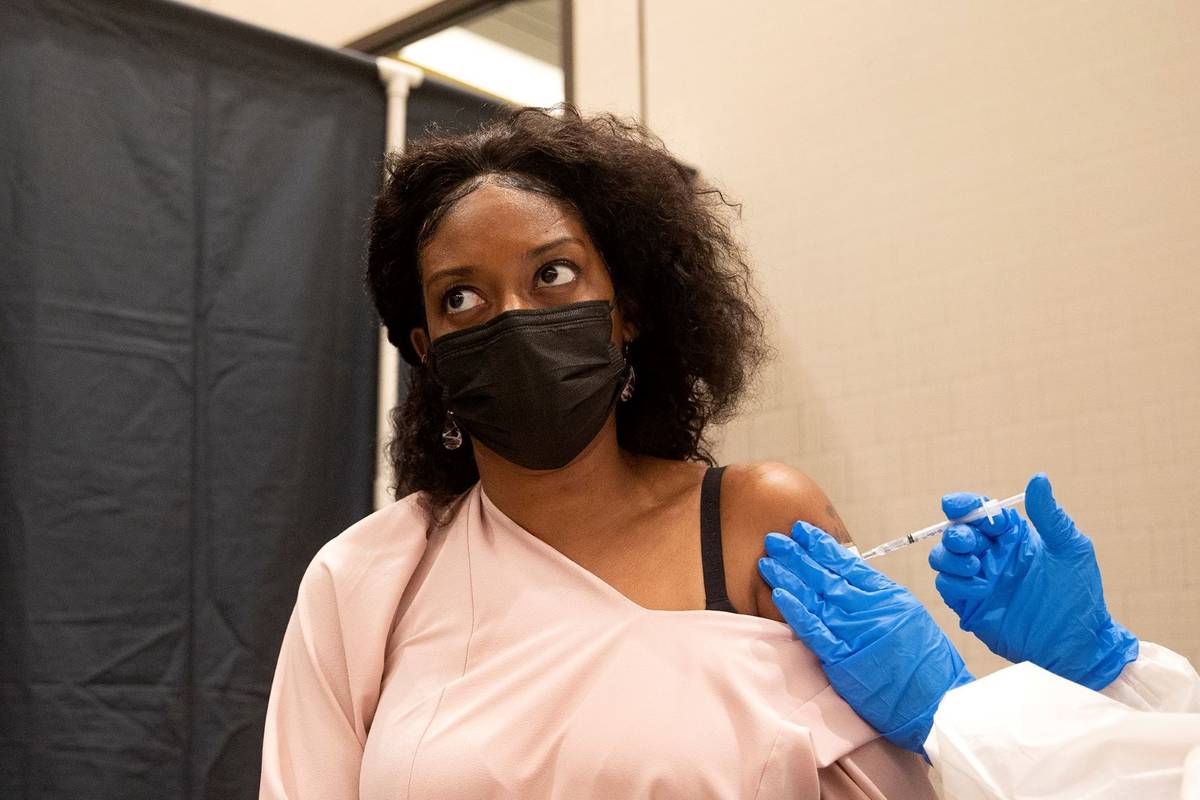Don’t blame the vaccines for breakthrough cases, experts say
Don’t blame the vaccines for growing numbers of COVID-19 cases in fully inoculated people, health authorities say.
Instead, many point to the more infectious delta variant with the still-high numbers of unvaccinated individuals who are fueling the virus’s wildfire-like spread in Las Vegas and communities across the country.
The delta variant “is now being transmitted so much among the unvaccinated, there’s spillover into the vaccinated population,” said Dr. William Schaffner, a professor in the Division of Infectious Diseases at the Vanderbilt University School of Medicine.
Despite rising numbers of these so-called breakthrough cases, the rate of infection in vaccinated people remains very low, suggesting that the protection provided by the shots hasn’t waned, he and other experts said.
National studies show that “97 percent of people who are hospitalized are unvaccinated and 99.5 percent of people who die are unvaccinated, suggesting that those who are fully vaccinated make up 3 percent of people who go to the hospital and less than 1 percent of people who go to the morgue,” said Dr. Paul Offit, a professor at the University of Pennsylvania and director of the Vaccine Education Center at Children’s Hospital of Philadelphia.
If vaccine protection isn’t waning, then there isn’t cause for members of the public to get booster shots, authorities say. But there may well be benefit in an extra dose for those whose immune systems didn’t stimulate an adequate response to initial doses. The Food and Drug Administration is expected to approve booster shots for those with weakened immune systems in the coming weeks.
Waning protection?
Breakthrough infections in vaccinated people now account for 16 percent of new COVID-19 cases in Clark County, Cassius Lockett, the Southern Nevada Health District’s director of disease surveillance and control, told the Review-Journal on Thursday.
Since June 1, breakthrough cases have accounted for 11 percent of COVID-related hospitalizations, he said. It is unclear how many of the hospitalizations were in COVID-positive patients with other conditions, such as heart attack or stroke. Deaths in fully vaccinated people accounted for 13 percent of COVID-related fatalities.
The growing percentages reflect how as more people become vaccinated, the percentage of COVID-19 cases in vaccinated individuals will also grow, without the rate of infection changing. To illustrate this point, Schaffner noted that if 100 percent of people were vaccinated, 100 percent of COVID-19 cases would be in vaccinated people.
Although breakthrough cases may surprise the public, scientists expected them. In clinical trials, the Pfizer and Moderna vaccines, for example, were shown to be about 95 percent effective in preventing symptomatic illness. This means that one in 20 people would be unprotected against symptomatic illness. But if they did become ill, they probably would experience a milder case than if they were unvaccinated.
Some recent studies have shown lower vaccine effectiveness with the delta variant. For example, an analysis by Public Health England indicated that two doses of the Pfizer vaccines were about 88 percent effective against symptomatic disease, down from 96 percent.
Countries such as Israel are preparing to give booster shots not just because of the variant but out of concern that the protection afforded by vaccine may be waning in some of the earliest recipients. Pfizer has pushed for a third dose, with some data indicating that the vaccine’s effectiveness against symptomatic disease had declined after six months to 84 percent from 96 percent.
It’s uncertain how long protection from COVID-19 vaccination lasts, with estimates ranging from six months to years. But many U.S. authorities say most evidence doesn’t suggest that protection at this point is significantly waning.
“If that were true, that vaccine immunity was waning in any critical way, you would start to see a fairly dramatic increase in people who are hospitalized or killed by this virus despite being fully vaccinated,” Offit said. “You’re not seeing that.”
As for booster shots for people with weakened immune systems, “I think we have been a little slow to do it,” he said. “I think it makes sense.”
Doses on the downlow
Hospitalizations and deaths from COVID-19 in fully vaccinated people are most likely to occur in older people and those with underlying health conditions, data from the Southern Nevada Health District suggests.
As of July 29, 71 percent of hospitalized breakthrough cases were in people 65 and older, and 82 percent had underlying health conditions, such as diabetes, high blood pressure or chronic lung or heart disease, according to data posted by the district on its website.
Many of those hospitalized wouldn’t necessarily be considered immuno-compromised despite having underlying health conditions.
It will be a “hornet’s nest” determining who exactly is immuno-compromised and eligible for a booster shot, said Schaffner, a member of the Center for Disease Control and Prevention’s Advisory Committee on Immunization Practices. Organ transplant patients, people with cancer receiving chemotherapy and individuals taking medication that suppress their immune systems are likely candidates.
In the meantime, Schaffner has heard anecdotes from colleagues about immuno-compromised individuals sneaking additional doses. Some will get an extra dose from a local pharmacy that doesn’t check their vaccination status. Others will cross into another state where their name won’t pop up on the vaccination registry.
Schaffner doesn’t recommend sidestepping the rules. “But I would say I understand. And I am impressed with that resourcefulness.”
Contact Mary Hynes at mhynes@reviewjournal.com or 702-383-0336. Follow @MaryHynes1 on Twitter.












































